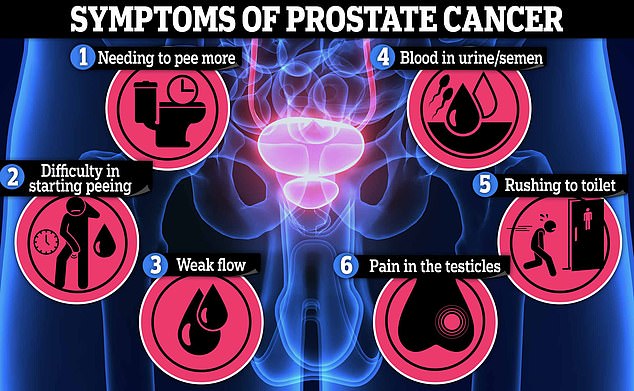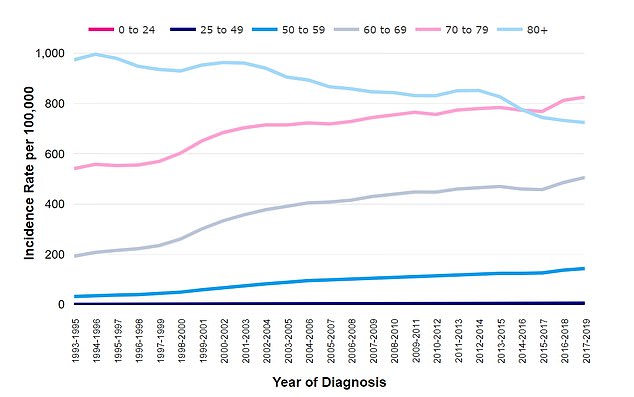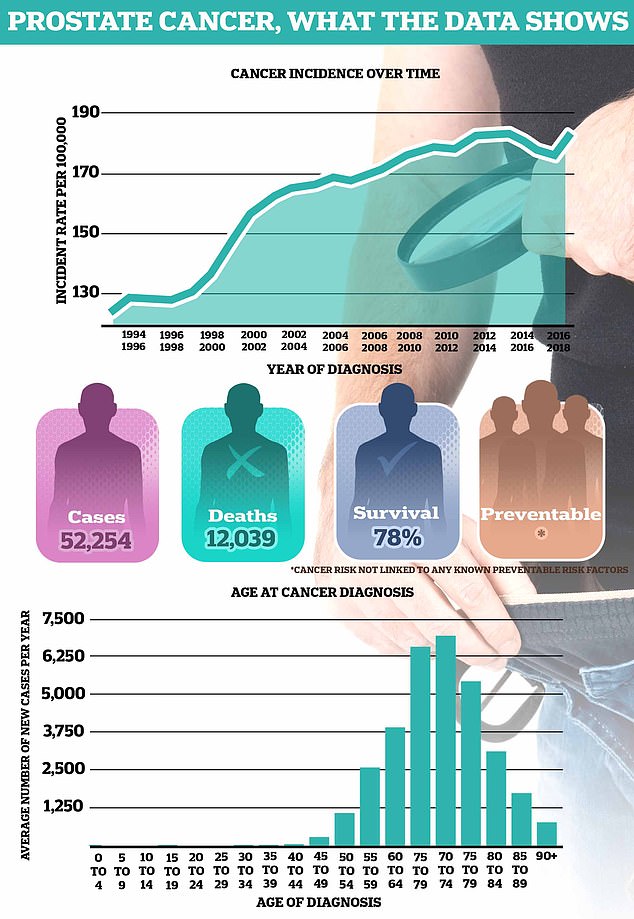Can riding a bicycle cause prostate cancer? Oddly enough, that was a question asked when cycling hero Sir Chris Hoy revealed he has an aggressive form of the disease.
The 11-time Olympic gold medalist, who is just 48, announced over the weekend that he has “two to four years to live,” and fans took to social media to express shock and sadness.
Others simply wanted to know why someone relatively young, and apparently fit and healthy, could be affected by a disease normally associated with older men.
In
He added: ‘Given Chris Hoy’s terminal prostate cancer, when will (the Government) address this issue?’
British cycling legend Sir Chris Hoy has revealed that he has incurable prostate cancer and could have “two to four years to live”, at the age of just 48.

Scientists have been exploring the relationship between prostate cancer and cycling for more than a decade. Pictured is Sir Chris taking part in the Platinum Jubilee competition in 2022.
Another user simply asked: ‘Is there a connection between prolonged cycling… and getting that type of cancer?’
About one in ten adult men ride a bicycle (twice as many as women) and it is most popular among people aged 50 to 60, ages at which prostate cancer begins to become a concern.
So all of this may have made reading worrying for some. But what is the truth?
Scientists have also long been concerned that cycling could affect the prostate, as bicycle seats put pressure on the perineum, the bottom of the pelvis, between the legs.
This, in turn, can irritate the prostate, due to the location of the gland, which helps the body produce semen, which is located within the pelvis, directly below the bladder.
Researchers have found that cycling can increase prostate-specific antigen (PSA) levels in blood tests.
This compound is released by the prostate, and if levels are higher than normal, it may be a sign that something is wrong with the gland.
Cycling sessions have been found in some studies to increase levels for up to 48 hours.
There is also evidence that regular cyclists are more likely to suffer from prostatitis, which is the medical term for inflammation of the prostate.
However, neither prostatitis nor elevated PSA levels, by themselves, are signs that someone has prostate cancer, nor are they known to increase the risk of developing the disease.
In 2014, a University College London study found that men in their 50s who cycled more than nine hours a week were five times more likely to develop prostate cancer than those who cycled less frequently.
The researchers analyzed data from more than 5,000 cyclists and also found an increased risk when men of this age cycled just over 3.5 hours per week.
But later studies, such as a 2020 paper published in the Journal of Clinical Urology Using data from 8,000 male cyclists, it failed to find a link between cycling and an increased risk of prostate cancer.

And other research has even suggested that cycling could help prevent the disease.
One such study, published earlier this year on more than 50,000 men, found that men who exercise regularly, including cycling, have a lower chance of developing prostate cancer compared to those who don’t.
The Swedish study, published in January, found that men who regularly engaged in cardiovascular exercise were a third less likely to develop prostate cancer.
The authors of the worrying 2014 University College London study even went so far as to claim We urge men to continue cycling for greater health benefits.
‘We wouldn’t recommend that people reduce their cycling volume. “Cycling has many physical and mental health benefits that currently outweigh any risks it may cause,” they wrote at the time.

This CRUK graph shows the incidence of prostate cancer over time among different age groups, while older men remain the most likely to suffer from the disease, rates have risen dramatically among younger men since the 1990s .
Regular exercise has been a well-established anti-cancer lifestyle adjustment.
Not only does it combat obesity, as excess fat increases the risk of cancer in general, but exercising also produces hormones that can help reduce the chances of cancer developing or growing.
British cancer charity Cancer Research UK (CRUK) says there are no known lifestyle factors that increase a man’s risk of developing it in his lifetime.
This does not mean that there are no factors that increase the risk of contracting the disease, but they are immutable, such as family history or ethnic origin.
For example, the risk of prostate cancer is generally higher among black men compared to those of different backgrounds.
As with most cancers, it is usually impossible to determine what exactly causes a specific case of prostate cancer in an individual.

More than 52,000 men are diagnosed with prostate cancer each year on average in the UK, making it the most common cancer in men. Around 12,000 men die each year from this disease, the equivalent of one every 45 minutes.
CRUK data shows that around 55,000 cases of prostate cancer are diagnosed in the UK each year, which is equivalent to around 150 men every day in Britain.
Prostate cancer is the most common cancer among men in the UK, with those aged 70 and over the most likely to be diagnosed with the disease, with 825 cases per 100,000 men.
However, cases of the disease have increased dramatically in young groups since the 1990s for reasons that scientists are still unsure of.
Rates have risen more than 600 per cent in this period among men aged 25 to 49, like Sir Chris, the biggest increase of any group.
However, the base level among young men remains low: just six cases per 100,000 men of this age, compared to one case per 100,000 in the 1990s.
Rates among people in their 50s have increased about 350 percent to about 150 cases per 100,000 men and 163 percent in people in their 60s to about 500 cases per 100,000.
Prostate cancer, if detected early, is highly treatable. Overall, nine out of 10 men with the disease will survive five years or more, and eight out of 10 will survive a decade.
The outlook is much less positive for advanced prostate cancer, with survival reduced to one to three years.
It is noted that prostate cancer in younger men, for the purposes of cancer diagnosis, those under 50, like Sir Chris, are much more likely to be diagnosed at an advanced stage.
This may be due to a lack of awareness of possible symptoms delaying seeking help or because doctors do not initially suspect that prostate cancer could cause problems in someone so young, leading to a delay in diagnosis.
A total of 12,000 men die from prostate cancer in the UK each year.
Symptoms of prostate cancer include needing to urinate more frequently, often during the night, needing to run to the bathroom to urinate, having trouble urinating or taking a long time to urinate, or feeling like the bladder has not been emptied when urinating. .
Blood in urine or semen can be a potential sign of the condition.
These symptoms can be triggered by a variety of conditions, not just cancer, but people are urged to report them to their GP anyway so the cause can be investigated.


